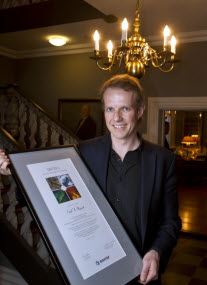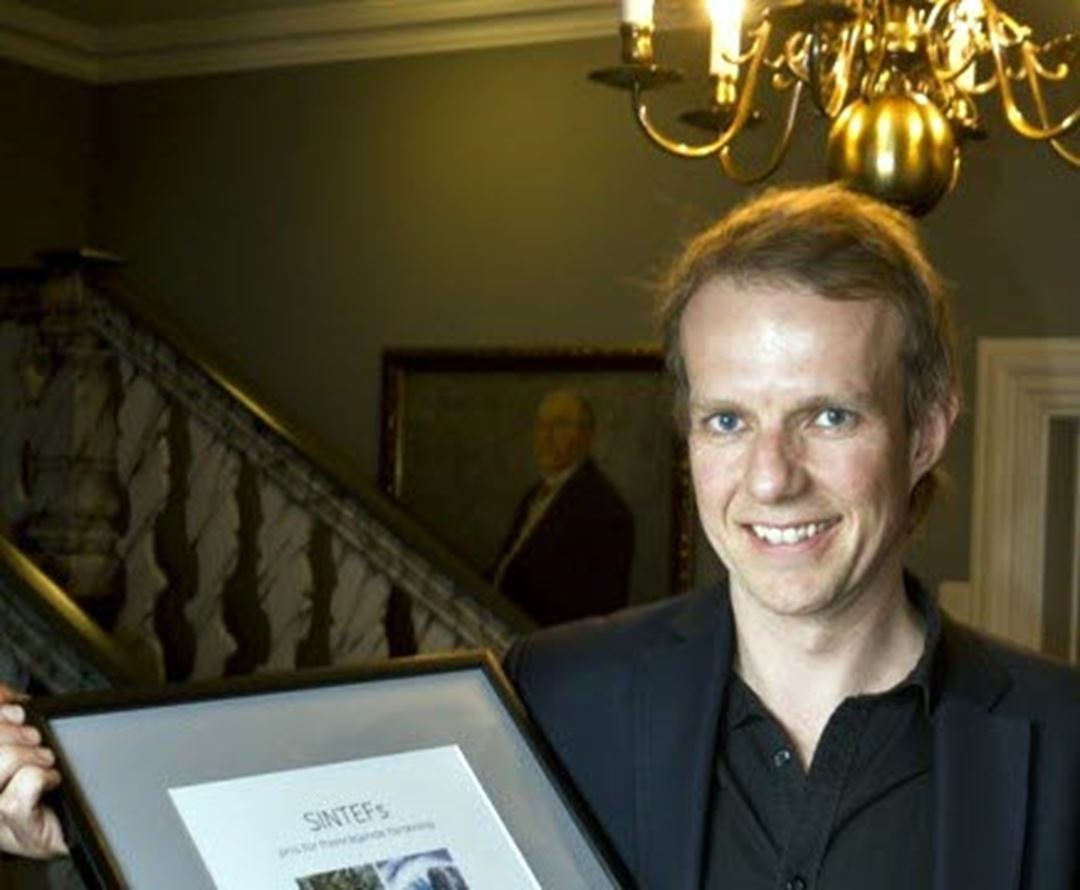The award, which is worth NOK 150 000, can be given to current SINTEF Group employees.
Brought out by prestigious publishing house
Røyrvik, a senior scientist at SINTEF Technology and Society, was awarded the prize for his book “The Allure of Capitalism – An ethnography of management and the global economy in crises”, published by Berghahn Books, a prestigious academic publisher based in New York and Oxford.
The book summarises Røyrvik’s ten-year programme of research in social anthropology on the topic of international corporate management, in which Norsk Hydro was the case company and research partner.

|
|
Emil A. Røyrvik with the visible proof of SINTEF’s Award for Excellence in Research. His award-winning book is already on the reading list for graduate students in economic anthropology at the prestigious City University of New York (CUNY). Photo: SINTEF/Thor Nielsen. |
Neoliberalism makes its entry
Røyrvik’s book demonstrates that the neoliberalism that marked the world of industry and finance from the 1980s onwards came relatively late to Norway and Norwegian industry.
In Hydro it picked up speed as recently as 1999.
According to Røyrvik, a change in company strategy in that year led to more focus on shareholder value and a general orientation in the direction of the investor communities and money-markets.
Management turned towards being largely focused on financial considerations, with a resulting change in emphasis from “industrial management” to “money management”.
This was a reflection of the general trend in the global economy to an all-pervasive financial capitalism and eventually to the economic crisis in which we now find ourselves.
Ideological conflict
At the awards ceremony, Røyrvik described how a similar change in emphasis probably took place throughout Norwegian industry.
His book discusses how traditional technology-oriented industrial capitalism was transformed into casino-like finance capitalism, and how this illustrates an ideological struggle over the importance and role of business and industry in society.
According to the award-winner, this ideological conflict turns on whether companies ought to be tools exclusively for creating value for their owners or to have a much wider social mandate in terms of creating jobs, welfare and democracy.
Before the financial crisis, in Røyrvik’s view, the pendulum swung too far to the side of looking at companies solely as machines for generating dividends. He suggests that the crisis has now probably in Norway started to swing it to some extent in the opposite direction.
Predicted the financial crisis
In his book, Røyrvik widened his scope to analyse management practices in Hydro, not only in a Norwegian context but also in the light of trends in the global economy.
The book is thus a broad anthropological description of management and global connections. As early as in 2005, Røyrvik was on the track of the crisis in the world economy that hit us with full force in 2008.
On reading lists in USA
Although the book was published as recently as towards the end of 2011, it has already attracted international attention. It has already been put on the reading list in economic anthropology at the prestigious City University of New York (CUNY), where it is used at MSc and PhD level.
Røyrvik’s work has also led to him becoming a contributor to “The Encyclopedia of Globalization”, edited by the renowned professor of sociology George Ritzer and published this year by Wiley-Blackwell.
by Svein Tønseth

